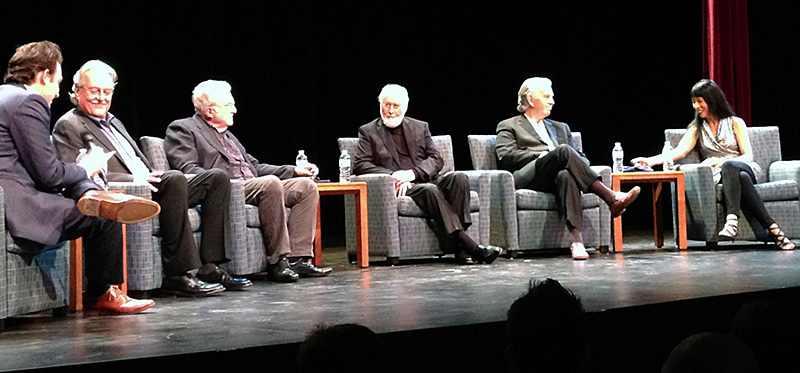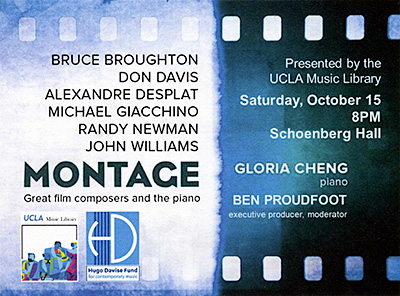

  |
|
|
||||||||||||||||||||||
|
FMS FEATURE... October 17, 2016 Montage: Great Film Composers and the Piano Pianist Gloria Cheng presents an evening with Broughton, Davis, Newman and Williams by Jon Burlingame WESTWOOD, Calif.—Pianist Gloria Cheng's album Montage: Great Film Composers and the Piano was the subject of a film premiere, a mini-concert and a panel discussion Saturday night at UCLA's Schoenberg Hall.  (L to R) Moderator Ben Proudfoot, Don Davis, Randy Newman, John Williams, Bruce Broughton and Gloria Cheng.  Cheng filmed the entire rehearsal and recording process, and producer Ben Proudfoot's 27-minute distillation of highlights debuted Saturday night before an appreciative audience of about 500. Entirely in piano-key-appropriate black-and-white, it focused on the sometimes arduous, sometimes amusing studio work that resulted in the critically acclaimed CD. Cheng and all six composers are interviewed; the film is now making the festival rounds (and is available for rent on Vimeo). Following the screening, Cheng performed excerpts from all six works, approximately 45 minutes of music, and received a standing ovation. After intermission, she was joined on stage by four of the composers: Williams, Newman, Broughton and Davis. (She explained that Giacchino was busy working on a new score and that Desplat was in Europe.) Proudfoot served as moderator. Asked to compare the tasks of composing for film versus composing for the concert hall, Davis responded: "When you're writing film music, you generally have to write minutes per day, and with concert music it's more like days per minute." Newman quipped: "In movie music you'll sometimes have to do things that you wouldn't want to do, so you'll just cough during that part," drawing laughter from the audience. Referring to the new pieces, Williams said, "All this music reflects our feelings, characteristics, experiences, personalities and so on. It's inescapable, really, like one's handwriting or thumbprint." Added Broughton: "Everything I ever learned to do in film, I could use as a composer. Everything I learned as a composer, I couldn't always use in films. In concert music I get to do what I want." Newman, whose wry commentary kept the audience laughing throughout the 45-minute panel discussion, told the crowd that one of his famous uncles (Marc Newman, an agent) once reminded him that writing film music was "better than threading pipe," and added that his uncles Alfred, Emil and Lionel – the subjects of his five-movement "Family Album" written for Cheng – were "down there watching as we speak," a comical hint that they were all in Hell. All the composers took time to praise Cheng's artistry. "In writing for Gloria," said Williams, "I thought about her art, her energy, her focus and her interest in contemporary music." Recalling his own years as a jazz pianist in the '50s and early '60s, he added, "I have such admiration for what Gloria does in technical terms." "Gloria's fearless," said Broughton, who is also a pianist. "She will play anything, and she plays it really well," adding that "she has the softest touch, she has so much control." Davis, who said he had known Cheng longer than any of his colleagues on stage, concluded: "Besides the incredible technique and the radiant sound that she pulls out of a piano, she has a mission, a sense of responsibility. Gloria has made a real, demonstrable impact on what it means to be a pianist, what piano music should be, and what people should be hearing." The event was presented in Schoenberg Hall by the UCLA Music Library and was streamed live. ©2016 Jon Burlingame |
Search
Past Features
|